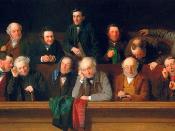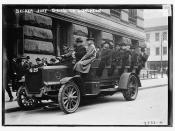Twelve Angry Men written by Reginald Rose who was once called for jury in New York City. This rendered him the experience of being a juror and propelled him to write such a story, because he wanted to show people what was really happening in the jury room. Twelve Angry Men depicts jury deliberations in a murder case. It is a primer on what to do and what not to do deliberating as a juror. At first, only one juror applies the correct legal standard of requiring proof beyond a reasonable doubt. He is the only juror who will not accept the prosecution's case at face value. His questions eventually lead a number of other jurors to make a searching inquiry into the facts presented at the trial. The first vote is 11 to 1 to convict, but at last vote is not convict for young man. Although they the other 11 men change their mind and reach the same verdict of "not guilty"� for that young man, the process of transformation and is quite different for each of them.
I would like to compare juror #7 and #11 to show how their attitude, judgment and personality affect this process and more importantly their standpoint toward life.
From this movie, we can easily find out that these two jurors, #7 and #11, have different attitude towards this case, which can be showed through the comparison of their conversation. " Hey, how about getting started here"�, " This better be fast, I got the ticket to a baseball game tonight"�, "Let's vote, who knows, maybe we can all go home"�. These words display that he never thinks about this case but how can he leave as soon as possible. He has tickets to a baseball game so he wants to get quick conviction and get out of the jury room. He is more interested in the baseball game than getting a justice for that young man. He never cares about the young man's destiny. His judgment of this case's is based upon superficial evidence and questionable testimony from the witness and surface rather deliberate thinking. He never bothers to think about it anyway. After they vote several times and still haven't got a uniform verdict, he looks very bored. " So what are you goanna doing about it? We can be here all night."� However, for #11, although he also thinks that the young man is "guilty"� in the first place, different from #7 he does not raise his hands very quickly when all jurors vote which shows that he has quite a lot uncertainty in his decision. He always keeps quiet when others are expressing their opinions and listens to them carefully. He also takes a good note writing down people's words. He analyzes the details and brings up questions when evidence for the case sounds doubtable. Secondly, let's look at their attitude through their behavior. #7 is careless, sluggish and impolite. He does not want to stay in the jury room for too long. He reaches the window and tries to open it. He always stands up and walks around. He feels hot and tries to open the fan and he looks at his watch from time to time all of which reflect his impatience. Obviously, to him, going home and watching game is more important than judging justifiably. When #9 expresses his opinion about the case, he never listens and begins to whistle. When foreman says to #7, "okay, how about going first?"� he answers is not me. He takes the gum out of his mouth and looks for place to throw it and finally he lets it fly. When we hear a thin clank, he seems satisfied. Unlike #7, juror #11, he is very humble. He sits in the chair quietly and listens to others carefully. Before they begin the discussion, #11 begins to make notes in a pad. When he does not understand other people's words, he looks up curiously and asks. He hopes he can get every detail form people's talking.
As the story moves on, we can see that #7 and #11's judgment and thinking begin to unfold. # 11 treats the case seriously and is deliberate in thinking while #7 is always trying to rush to a conclusion without caring about the justice. Their occupational background may give us some clue of this difference. #7 is a salesman, who needs to deal with a lot of different people everyday. What he tends to care about is how to sells his goods to his customers as many and as quick as possible, no matter by what means. In other words, if he can reach the goal of making more profits, he would take any method that can quickly works even if it is against his conscience. There is no need for him to take responsibility after the customs by his products and go back home. While for #11, he is a watchmaker. He takes a job, which needs people's exquisite workmanship by each step. He needs to think carefully and plan each step ahead of time and try not to make any mistake; when problems occur, he needs to analyze it with patience and find a correct way to solve them. As we can also see in the case, juror #11 is an analytic person. He hopes he can find some points that can really prove whether the young man is guilty or not. He makes a clear note and explains step by step to make everybody understood. At the beginning, he is not sure about it himself. When he takes notes and listens to each detail, he finds more evidence. He changes his judgment by proof. But for #7, he never analyzes the whole case, he always says something following other jurors opinions.
Moreover, we can find that another difference between them is their personality. #11 is very loud. He always makes a conclusion without grounds even if he does not have his own opinion. However, he likes to talk loudly to draw other people's attention, he hopes they can reach an agreement as soon as possible without talking and kicks up a fuss. #11, is quiet, humble and ashamed. He is a refugee from Europe who came to this country in 1941. He is not a Native American and speaks with accent. This is a very important reason leading his vote to "guilty"� at the beginning. As a minority, he may concern that his opinion won't be accepted anyway. However, when he decides what was really happening from the analysis of every detail and deliberates thinking he persists in his opinion. He also has the sense of responsibility to this case, he does not think they should sit here and waste time, he thinks carefully and try not to miss every detail. " Pardon, this fighting. This is not why we are here to fight. We have responsibility. This, I have always thought, is a remarkable thing about democracy."� On the contrary, #7 is a flashy while cowardly man. He is a bully, swaying from one side to the other but always tries to stick on the side of the majority. When he changes his vote to "not guilty"�, #11 asked him, " Why do you think it is not guilty?"� " I think it is not guilty"�, " but, why?"� " Why, why, because not guilty"�. He cannot say anything to defend his point and do not have the courage to argue further.
To me, Twelve Angry Men is just an epitome of our real life. It depicts vividly how different people treat the same thing differently and how they change their decision base on their attitudes, thinking and personalities. This film shows the dynamics of jury deliberations, the angry, the false stats, the personality conflict, the joint effort and the functioning of several minds together to ferret out the truth, which can be applied to our daily life when we are dealing with this society. Twelve Angry Men is an emotion picture that speaks to the intelligent heart of the viewer. It is likely to add significant memories to fund of experience used by each of us to understand our universe and to determine our future action. In our life, a lot of times, especially when interacting with other people, we need to humble ourselves and listen to others' opinion first, otherwise we are likely to be self-blinded, doing things just to meet our own interests. It is also important for us to know the skills of how to deal with conflicts. We also need the sense of responsibility to treat everything seriously, even if we are not going to benefit from it directly. All these assets are essentials to keep this society running smoothly, because none of us can isolate ourselves from this society, we are all social existence.





